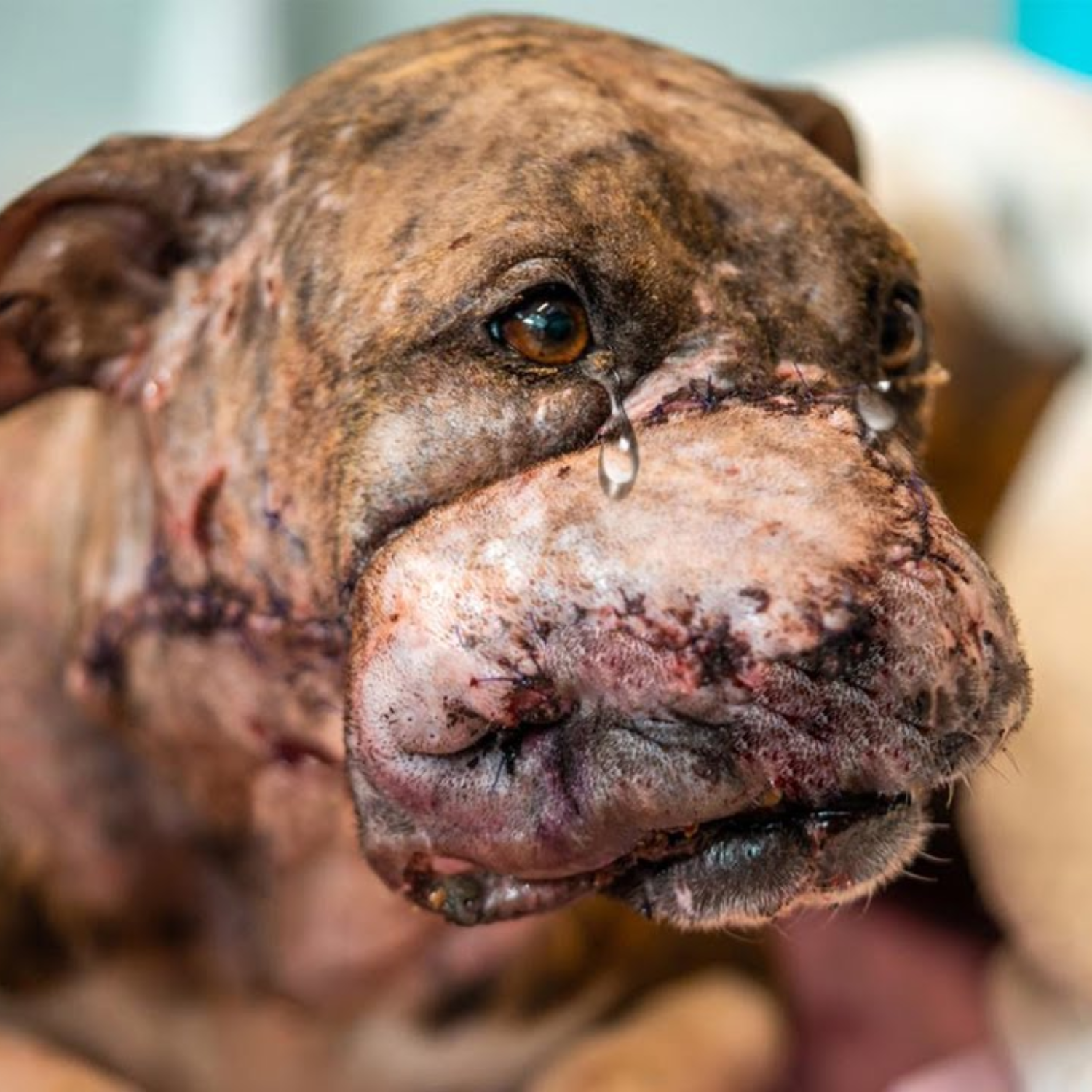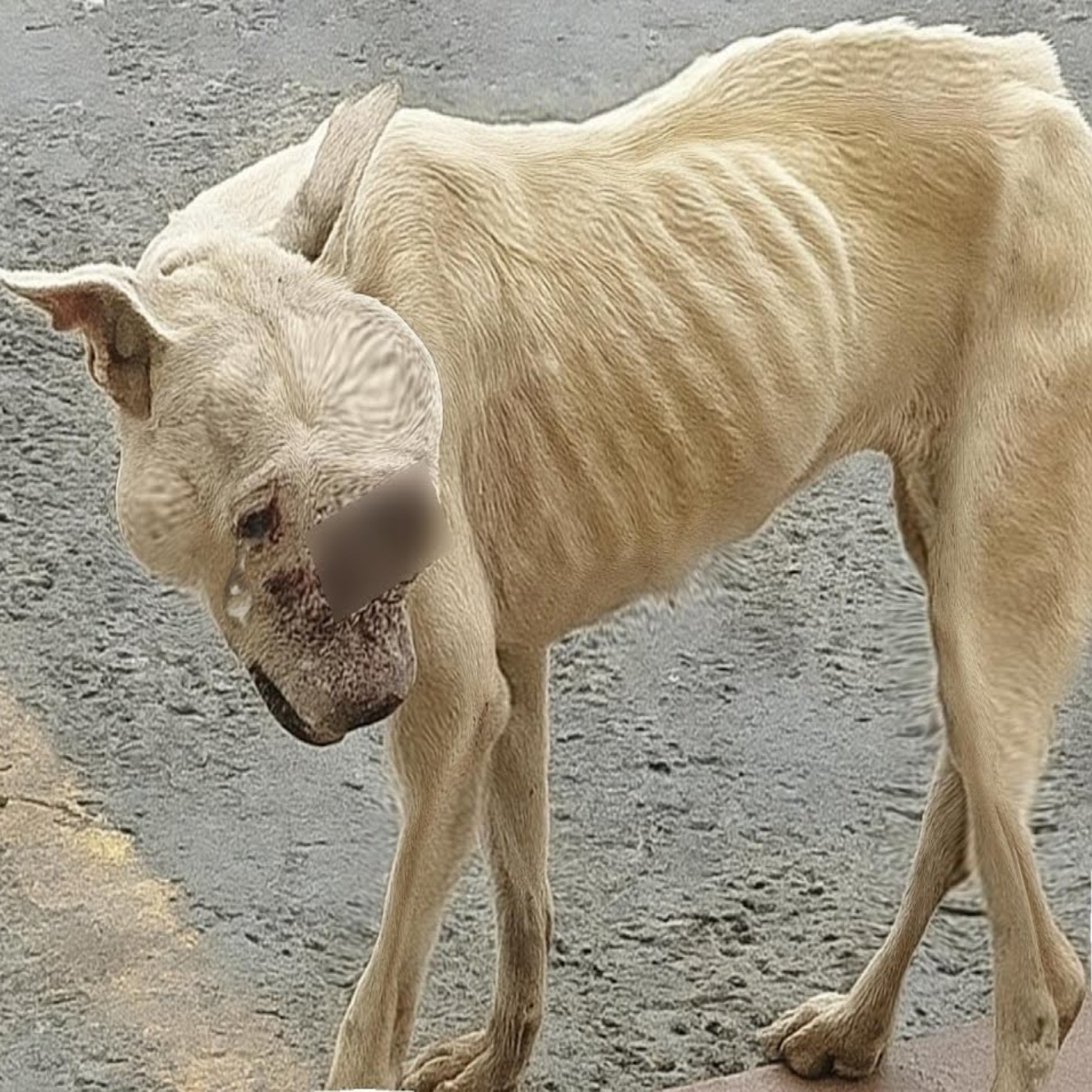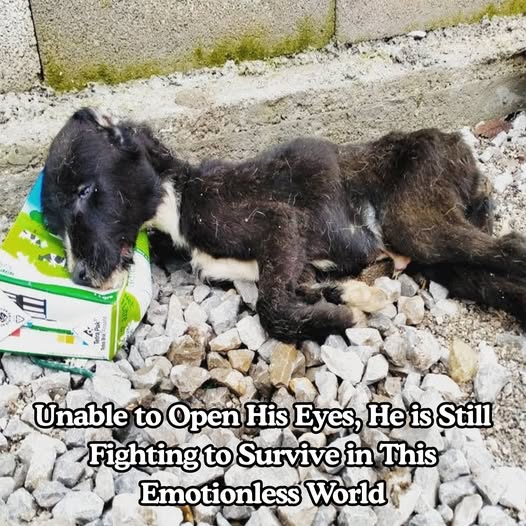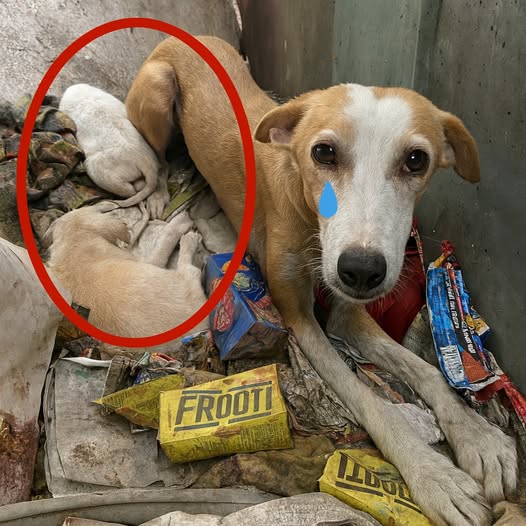For most of his life, Leon knew nothing but darkness, chains, and neglect. Blind and tethered to a heavy chain, he was left without food, without water, and without affection. His world was defined by loneliness—days blurred into nights with no warmth of a kind hand, no sound of comforting words.
When rescuers arrived to take him away, his owner did not resist. In fact, he seemed almost relieved, even happy, to hand Leon over. At that moment, it became clear why: the dog was frail, starving, and covered in wounds caused by years of restraint. His body bore the marks of suffering, but his spirit still longed for freedom.
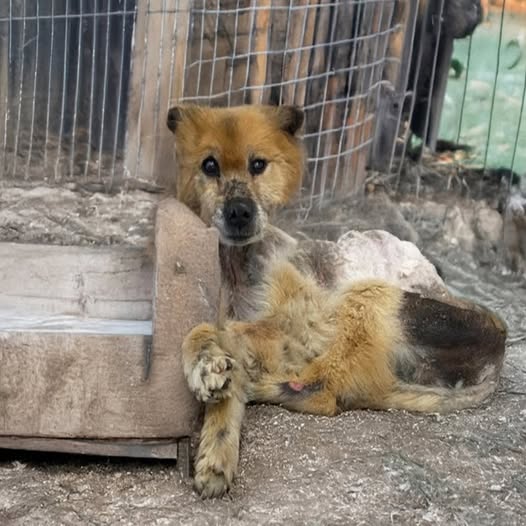
The moment the chain was removed, Leon’s reaction was unforgettable. Despite his blindness, he stepped forward cautiously, then began to explore with an eagerness that surprised everyone. His nose quivered, his tail wagged, and for the first time in his life, he dared to imagine what freedom might feel like.
Yet his joy was shadowed by the state of his health. When veterinarians saw Leon, they could barely believe he was still alive. His weight had plummeted to just 7.44 kilograms—barely a third of what a healthy dog of his size should weigh. Every rib showed, his muscles were wasted, and his eyes, though clouded, glistened with silent tears. When one rescuer bent down and embraced him, Leon trembled. Then, slowly, he leaned in. That was the first time in his life he felt loved—and the moment left a mark on everyone present.
Biochemical tests confirmed the fears: Leon’s liver was failing, his body was weak, and recovery would be long, costly, and uncertain. But the team refused to give up. They began treatment, wrapped his wounds, and promised him the care he had been denied all those years.
Over the next three months, something miraculous happened. With nourishing food, regular medical care, and endless affection, Leon began to gain weight. His dull coat softened, his fragile body grew stronger, and the sparkle of life returned to him. It seemed that his nightmare was finally over.
But life had more challenges in store.

Suddenly, Leon’s condition deteriorated. His head tilted sharply to one side, he became disoriented, and worst of all—he refused to eat. The rescuers panicked. They rushed him from one clinic to another, desperate for answers. Yet even the doctors were puzzled. What was happening to him? Why was his health unraveling just as he was beginning to thrive?
Week after week, Leon was taken to the vet for tests and medications. Finally, the truth emerged: small tumors were forming inside his head. The news was devastating. Specialists considered surgery, but when they reviewed his case, the risks became overwhelming. Leon suffered from an enlarged heart, pulmonary edema, and chronic bronchitis. Anesthesia could kill him. The decision was crushing—the surgery had to be canceled.
All they could do was rely on medications and supportive care.
It was an excruciating time. Leon had never received medical attention in his entire life. Every pill was a battle, every injection a painful reminder of how fragile he was. The rescuers often cried, pouring out their hearts and sweat for a dog who had already suffered more than most could endure. They described him as “a soul that had only known loneliness, darkness, and sadness.” And yet—even in his weakest moments—Leon tried.
Slowly, painfully, there were signs of hope. With the dedication of his caregivers and the support of compassionate veterinarians, Leon regained some stability. His orientation improved, his appetite returned, and most astonishingly—the tumor began to shrink.
Hope bloomed once more.

Every day became a small victory. The team took him outside to feel the sun on his fur, to breathe the fresh air, and to experience the world he had been denied for so long. Even though he could not see, he lifted his nose toward the breeze as if inhaling freedom itself. These walks became sacred rituals. Each step Leon took was not just physical—it was symbolic of his refusal to surrender.
He began eating heartily again. His strength improved. And soon, he surprised everyone: Leon stood up on his own, steadied himself, and walked. That moment, after so much despair, brought tears of joy.
The months that followed were filled with cautious optimism. The rescuers did not stop searching for better treatments, new therapies, and innovative ways to help him live comfortably. Veterinarians from different regions reached out to offer guidance, touched by Leon’s story and resilience. The community rallied around him, proving that compassion knows no borders.
At last, after countless tears, sleepless nights, and desperate prayers, Leon began to recover in earnest. His tumor showed signs of regression, his body grew stronger, and he learned to enjoy life in a way he never had before. For the first time, he was not just surviving—he was living.
The rescuers described it beautifully: “Every smile he gives us is a reward for all the struggles we went through.”

Today, Leon spends his days soaking up the warmth of the sun, savoring meals that once seemed like a luxury, and walking alongside the people who refused to abandon him. Though blind, he perceives love more clearly than anyone. Though fragile, he carries a strength that inspires all who meet him.
He has endured loneliness, hunger, pain, and despair. But through it all, he discovered freedom, healing, and family.
As his rescuers say: “We don’t know how many tears he shed to reach this day. But now, Leon lives his life to the fullest. And we are grateful for every single moment.”
Leon’s story is not just about the cruelty of neglect. It is about resilience. It is about the healing power of compassion. And above all, it is about the truth that even the most broken soul can shine when given a chance to be loved.
